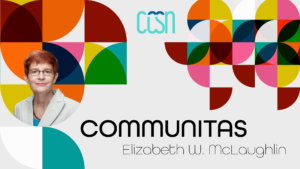Column Entry: The Image of God and a Fresh Start
Column Description: The term Communitas refers to an unstructured community of equal members often traveling from one place to another. Like the characters in Chaucer’s Canterbury Tales, we are fellow pilgrims on the road towards the Father’s house, following Jesus as the way, truth, and life. This column is a space to share common ideas about faith, communication, and culture with the intent of affirming the image of God in all persons.
By Elizabeth McLaughlin, PhD, Bethel University
August 2022 / July 2022 / January 2022 / September 2021
The Image of God and a Fresh Start
After graduation last spring, college professors from all over the country reported being overwhelmed and burned out. This past semester was different somehow: students coming to class without turning in any work, high anxiety in all levels of the university, absences, and a quiet sense of depression. This malaise affected large universities and small, private ones. Even the Chronicle of Higher Education ran an article about tenured professors leaving their positions because of the pressure.
How can we start a new semester from a perspective of anticipation and hope? While the needs of students and demands from our institutions increase, this question is more than Pollyanna self-talk. The challenges are real, and it is easy to become exhausted.
As Christians, we can reset our perspective through seeing our students, colleagues, administrators, parents, and ourselves as fellow image-bearers who carry sacred worth. Instead of letting people and their needs become items on our to do lists, this basic truth can refresh us to the sacred nature of our calling and service. It can start by reducing some of our cultural and institutional demands and seeing the calling of teaching in a new light. A fresh approach to education can help restore hope to the human side of the dance of learning.
Embracing Our Value as Humans called to teaching
In their pre-pandemic book The Slow Professor: Challenging the Culture of Speed in the Academy (2016), professors Maggie Berg and Barbara K. Seeber offer the vision of slow teaching and becoming a “Slow Professor,” positioning the art of teaching in contrast to the quantifiable culture of efficiency and productivity. As friends and colleagues, Berg and Seeber supported each other in their counter-cultural move to teach in harmony with the slow movement in other areas of life. “We envision Slow Professors acting purposefully, cultivating emotional and intellectual resilience” They continue, “By taking the time for reflection and dialogue, the Slow Professor takes back the intellectual life of the university.”[i] They see this resistance to the growing demands of faculty from the institution and from ourselves to continue to do more in less time. This returns the professor-student relationship as a solid foundation for learning. Education equals relationship and not just information transfer.
The concept of the Slow Professor resonates with philosopher Martin Buber’s I- Thou/ I-It contrast to see the other (Thou) as a person with whom we share common humanity opposed to seeing others as things (It) we must contend with. Students are image-bearers with whom we share our lives and subject matter, and not one more thing on our to do lists. An overemphasis on speed and efficiency can kill the opportunity for I-Thou relationships.
Serving Students
Introducing students to their own dignity as image-bearers and remembering that we, too, are beloved daughters and sons of God sets up a classroom primed for respect. To reinforce this reality, we need to learn our students’ names, listen to their concerns, attend events, teach well in a clear manner, and do our best to be available outside the classroom in healthy ways. Berg and Seeber comment, “Recognizing our own and our students’ embodiment shifts the emphasis of our pedagogy” to the emotional state of caring about the topic.[ii]
Cherishing Colleagues
Slow-inspired thinking and making space for greater connection takes time and strategies for avoiding unnecessary busyness. This can also work against unnecessary stress and burnout in our classrooms. While professors of all ranks have varying ability to control their schedules, the shift to consider the slow approach in more areas can help open the door to better relationships with our colleagues and within our learning communities. To reset teaching to include reflection and dialogue between professors and students and professors with each other can help offset professional disengagement. “Even the privileges of tenure have a downside. Flexibility of hours can translate into working all the time, particularly because academic work by its very nature is never done.”[iii] This urge to work all the time can add to stress and feeling out of control.
How Can We Make This Happen?
While we cannot change our corporate cultures individually, there are some ways that we can more towards a teaching culture that accommodates a slower approach that honors the image of God in ourselves and our students.
- We can start a dialogue on campus to see if other colleagues the need for some changes. This can become a small community of mutual support for sharing strategies and ideas.
- We can examine our classes to find areas where approaching a topic differently can incorporate space for more reflection in learning. It can be something as simple as removing one large assignment for a smaller one.
- We can start a fresh semester with a perspective of generosity towards ourselves of being humans who deserve outside lives and the ability to be imperfect, while offering students the same grace.
- We can remember that our worth is not the same as our usefulness.
May the God of all comfort be with you in the coming semester.[iv]
Notes
[i] Berg, Maggie and Barbara K. Seeber. The Slow Professor: Challenging the Culture of Speed in the Academy (2016). Toronto: University of Toronto Press, x.
[ii] Ibid, 36
[iii] Ibid, 3.
[iv] I Corinthians 1:3.

